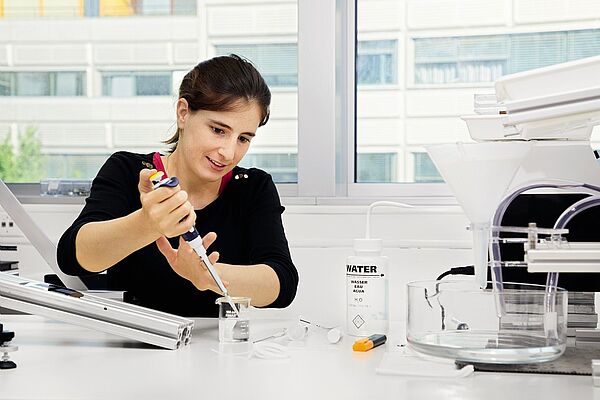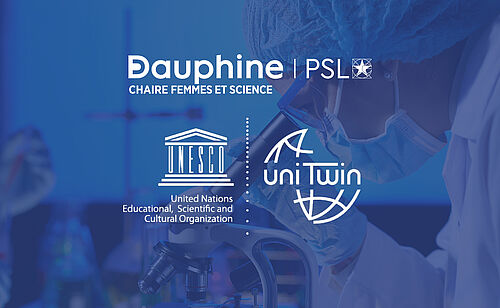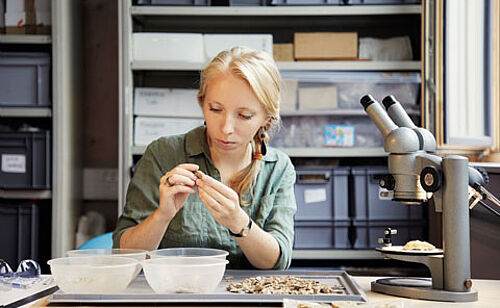Call for Research Projects 2021- Women and Science Chair

In 2021, the Women and Science Chair at Paris Dauphine-PSL University, member of the UNESCO chairs network, launches its third call for research projects, aimed at the entire academic community without any restrictions in terms of disciplines or in terms of methodology (field studies, modeling, empirical studies, experimental approaches, etc.). Every year, 5 to 7 research projects are selected and receive support of up to € 10,000.
Funded projects will focus on themes considered as priorities by the Steering Committee of the Chair (see below). These themes relate exclusively to the role and place of women in the exact and natural sciences (life and environmental sciences, physical sciences, formal sciences, engineering), even if the tools and methods of analysis used by the candidate teams can relate to all disciplinary fields.
By submitting an application, project leaders undertake, if they are selected, to participate in one or more events of the Chair, to produce a short video on their work and to write a short presentation of the conclusions of their works (in French and English) accessible to a wide audience.
Selected projects must mention the support of the Chair. A researcher can only receive one time the financial support of the Chair.
The deadline for the submission of applications to this call for research projects is May, 15, 2021.
More information about the Women and Science Chair
How to reply to the call for projects
1. Application
Projects conducted by senior researchers (who have already obtained a doctorate and published research papers) are eligible, regardless of nationality, place of practice or discipline.
The call for projects is published on SSRN and INOMICS. Application files can be submitted directly to one of these platforms or sent by email to aida.hamdi@dauphine.psl.eu by the May 15, 2021 at midnight (Paris time).
Each application will be written in French or in English and will consist of the following elements:
- A title,
- ½ page of summary,
- 1 methodology and calendar page,
- ½ page including the list of participants and the financing needs of the project with details of the different type of expenses,
- ½ page on contextual elements (does the project have already started, is the research project based on particular studies or experiments?),
- The CV of the project leader (mandatorily a senior researcher).
2. Selection
The members of the steering committee of the Women and Science Chair, as well as the members of the scientific committee, will evaluate the applications.
The selection criteria are:
- the adequacy of the project with the themes of the call for projects,
- the scientific excellence of the project,
- the feasibility of the project within reasonable deadlines,
- the quality of the team of researchers involved,
- the innovative dimension of the project,
- the scope of the expected results,
- where appropriate, transdisciplinarity and parity of the research team.
Particular interest will be given to projects involving researchers from different disciplines and / or involving international analyzes and comparisons. The selection committee will also ensure, as far as possible, a good geographic representation of all the projects funded by the Chair.
3. Calendar
May 15, 2021 at midnight (Paris time) : closing of the call for projects
May 2021 : evaluation of the applications
June 2021 : announcement of selected projects and agreements signing
Priority Themes of the Women & Science Chair
- Impact of not taking gender into account in the design of scientific studies,
- Impact of the absence or under-representation of women in scientific sectors (STEM) on the quality of research and strategic decisions,
- Career trajectories, career and wage gaps intra-company or cross-companies by sector (for example, in medicine, data analysis, artificial intelligence, industry, etc.)
- Supply and demand in scientific tracks (SYEM),
- Evaluation of public policies or experiments and international benchmarks,
- Determinants of the lower representation of women in scientific tracks and careers (STEM):
- Impact of the environment: social representations, parents, teachers, role of men, their views on the place of women in science, opinion of male scientists on gender equality in their profession, family life
- Links between choice of courses/tracks and school performance,
- Self-confidence, risk aversion and decision,
- Identification of rupture/dropout zones.
Members of the Scientific Committee of the Women and Science Chair
- Elyès Jouini, Professor, Paris-Dauphine University - PSL
- Clotilde Napp, research director at the CNRS, Paris-Dauphine University - PSL
- Thomas Breda, CNRS Research Fellow, Paris School of Economics and Institute of Public Policies

